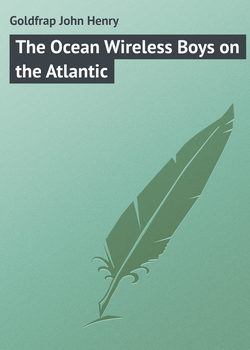Читать книгу The Ocean Wireless Boys on the Atlantic - Goldfrap John Henry - Страница 9
CHAPTER IX
ОглавлениеA TALK ON WIRELESS
“Good for him!” cried Jack, surprised into what was almost a cheer. “But,” he added grudgingly, “he took long enough about it.”
“Suppose you go ahead and attend to your end of the job and let the skipper manage his,” rejoined Raynor, in a quiet voice; and Jack, with a very red pair of ears, set himself down to the key.
The young third engineer was off watch, so he took a seat on the edge of Jack’s bunk and watched the lad manipulating the key with deft, certain fingers.
Crack-ger-ack-ack-ack! Crack-ger-ack-ack-ack! whined the spark as the boy alternately depressed and released the sending key. Then he switched over to “listen in.”
But no answering sounds beat against his ears. The signal had, apparently, fallen still-born on the wings of the storm. This went on for some fifteen minutes and then Jack gave up for a time.
“Nothing in our field or else my waves are too weak,” he explained to young Raynor, who listened with interest.
“I don’t understand what your wireless gibberish means,” he laughed, “but if you’ll teach me, I’ll learn some day.”
“Sure you will,” said Jack cheerfully; “it’s as easy as rolling off a log.”
“Yes, when you know how,” rejoined Raynor.
They sat silently for a time, while Jack again tried to raise some other ship, but without success.
“Looks as if the ocean must be empty just about here,” he commented.
“Would you be bound to get in touch with another ship if there was one within range of your instrument?” asked young Raynor presently.
“Not necessarily. There might be a dozen things that would interfere.”
“The storm, for instance?”
“Not that cause any more than another. There’s a lot that is mysterious about the wireless waves. Even to-day, nobody knows all about them. Sometimes, for no apparent cause, they will work better than at other times.”
“On a fine day I suppose they work best.”
Jack shook his head.
“On the contrary, at night and on foggy days, the Hertzian waves are sometimes most powerful. All things being equal, though, they work better over the sea than the land.”
“What is the longest distance a message has ever been sent by wireless?” was young Raynor’s next question.
“The last one I heard of was seven thousand miles. At that distance a ship off the coast of Brazil heard a call from Caltano, Italy. Think of that! That message had traveled across Italy, over the Mediterranean, slap across the northwestern part of Africa, and then went whanging across the Atlantic to a spot south of the Equator!”
“Going some,” was young Raynor’s comment.
“But that isn’t the most wonderful part of it. If that message went seven thousand miles in one direction, it must have gone an equal distance in an opposite one. That would make it encircle almost half the world.”
“Curves and all?” asked Raynor.
“Curves and all,” smiled Jack.
“And how fast does this stuff – the electric waves, I mean – travel?” asked the young engineer.
“Well,” said Jack, “it is estimated that a message from this side of the Atlantic would reach the Irish coast in about one-nineteenth of a second.”
“Oh, get out! I’m not going to swallow that.”
“It is true, just the same,” said Jack. “I know it is hard to believe; lots of things about wireless are.”
“Well, I mean to learn all about it I can.”
“You’ll find it well worth your while.”
“I believe that it is the most fascinating thing I’ve ever tackled.”
“In the meantime, I wish I could raise a ship,” grumbled Jack, again sending out his call.
“If we were sinking or in urgent difficulties right now, would you stick on the job till we raised some rescue ship?”
“I hope so. I’d try to,” said Jack modestly. “The history of wireless shows that every operator who has been called upon to face the music has done so without a whimper.”
While he worked at the key and the spark sent out its crepitant bark, young Raynor peered out at the tumbling sea through the port of the wireless cabin.
“Hullo!” he exclaimed presently, “we’re swinging round.”
“I can feel it,” said Jack, as the Ajax, instead of breasting the seas, began to roll about in the trough of them.
The heavy steel hull rolled until it seemed that the funnel and the masts must be torn out by the roots. Both boys hung on for dear life. After a while the motion became easier.
“Good thing I’m not inclined to be sea-sick,” said Jack, “or this would finish me.”
